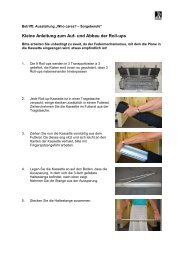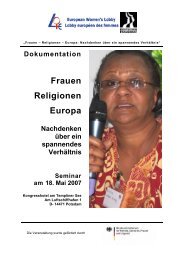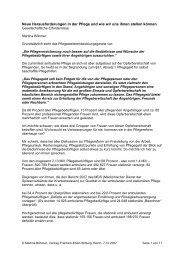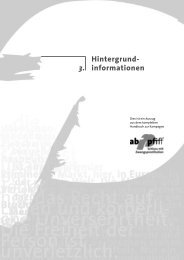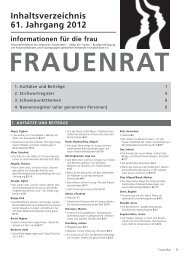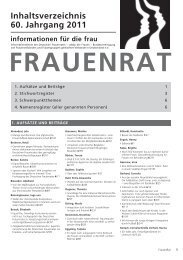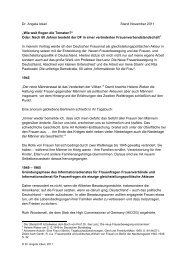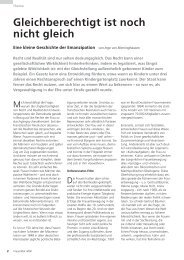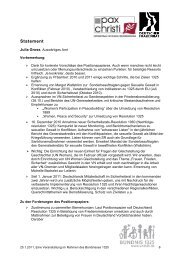Abpfiff - Deutscher Frauenrat
Abpfiff - Deutscher Frauenrat
Abpfiff - Deutscher Frauenrat
Erfolgreiche ePaper selbst erstellen
Machen Sie aus Ihren PDF Publikationen ein blätterbares Flipbook mit unserer einzigartigen Google optimierten e-Paper Software.
12<br />
Trafficking in women<br />
“Trafficking in women“ is not a formal legal term.<br />
Nevertheless, it is commonly used, especially by nongovernmental<br />
organisations (NGOs) to draw attention to<br />
an extreme form of abuse that targets women. It includes<br />
not only trafficking in women for prostitution, but also<br />
for other unprotected, exploitative, and slave-like labour<br />
relations and for marriage.<br />
* From: www.kok-buero.de<br />
Forced prostitution<br />
A Moroccan woman who was promised education<br />
in Germany and brought to a family there with<br />
forged documents was compelled to work in that<br />
home under the threat that she would otherwise<br />
be reported to the immigration authorities. When<br />
she refused a demand for sex services, she was<br />
reported to the police, accused of prostitution<br />
to her family, and jailed for deportation.<br />
This case is described in the study published by the<br />
ILO in 2005. Trafficking in women for the purpose<br />
of sexual exploitation (forced prostitution) is the<br />
most lucrative form of human trafficking. The study<br />
estimates e.g. that one forced labourer can bring<br />
a pimp or trafficker an average profit of 67,200 US<br />
dollars per year via commercial sexual exploitation.<br />
The OSCE estimated in 2001 that approximately<br />
200,000 people, especially women and children,<br />
are smuggled into Western Europe and sold. The EU<br />
estimates that around 140,000 women are sold in<br />
the EU every year. Other organisations and groups<br />
consider the real number to be substantially higher.<br />
There are no confirmed figures, and no serious<br />
investigation of the extent of unreported cases. But<br />
one thing is not disputed, namely that trafficking<br />
in women for the purpose of sexual exploitation<br />
constitutes an enormous market. In Germany as well.<br />
The boundaries between illegal and forced<br />
prostitution are fluid. Many women, especially<br />
from Central and Eastern European countries, work<br />
illegally as prostitutes in Germany. They come to the<br />
country for a limited period of time in the hope of<br />
making a lot of money quickly and then returning<br />
home. Some have already worked as prostitutes<br />
in their countries of origin, others have not.<br />
Some of these women are recruited in their<br />
countries of origin under the false pretences<br />
of a well-paid job such as waitressing. They are<br />
deliberately deceived and not told that they are<br />
to work as prostitutes. Once in Germany, they are<br />
forced into prostitution by a number of means.<br />
Other women are recruited directly for prostitution<br />
in the target country, where they are deceived about<br />
working conditions and potential earnings.<br />
A large part of their revenue is taken by pimps. Most<br />
are charged a so-called placement fee by pimps,<br />
and told that they can rapidly earn this sum.<br />
In the eyes of the law, these types of transactions for<br />
prostitution are also considered human trafficking<br />
for the purpose of sexual exploitation. Once again,<br />
the crucial points are the use of coercion and<br />
deception. Coercion can also mean indentured<br />
servitude, i.e. when the woman herself or her<br />
family at home is subjected to severe intimidation<br />
until the debt for her “placement“ is paid off.<br />
Most of these women are forced to lead a double life<br />
because their families are not aware of their activities.<br />
Societal taboos are thus reflected in the family as<br />
well. The majority of the women are not informed<br />
about the legal consequences of their actions or about<br />
the arduous working and living conditions. Often<br />
the establishments are run down and the working<br />
conditions pose health hazards. Many women are<br />
isolated from the outside world, and can only rarely<br />
leave their place of work. High costs for room rental,<br />
lawyers, pimps, etc. prevent them from making<br />
the money they anticipated. Exploitation is made<br />
easier by their lack of legal status, combined with<br />
a dearth of information and language skills. Illegal<br />
labour in Germany means a high level of pressure<br />
and the constant fear of police checks or raids.



